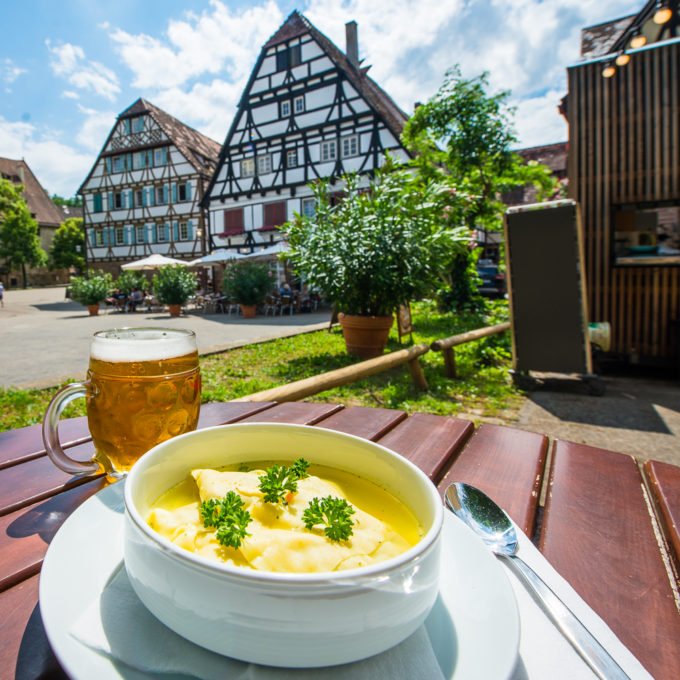
Don’t let the truth ruin a good myth. Or a good dumpling.

Don’t let the truth ruin a good myth. Or a good dumpling.
Maultaschen in Swabia
Maultaschen, so the story goes, were invented to cheat God. That’s the simplest way of explaining why I am here, at one of Europe’s best-preserved medieval monasteries, wearing headphones and looking at a window sill which, according to the audio guide, is clearly 300 years younger than its neighbors. (This is not clear to me.)
I am here because, according to legend, monks at this monastery weren’t allowed to eat meat during fasting days. So they sneakily mixed meat with spinach and wrapped it in pasta, creating a sacrilegious dumpling that they could enjoy, without God being any the wiser.
This excellent fable tells us almost nothing about where Maultaschen (literal translation: “feed bags”) really come from, of course. But one thing is certain when it comes to mythical origin stories: a superhero journey is soon to follow. And that’s true here, too. Maultaschen are a marker of Swabian cultural identity, rising above the rest of the plain, starchy, soupy meals that characterize regional fare here in southwestern Germany. There’s a reason why people from this area are known as Suppenschwaben (soup-swabians)—almost every food is served in a broth. That’s what a few hundred years of ascetic piety will do to your cuisine.
So I’m here, poking around a famed medieval monastery, looking for traces of ravioli’s unpopular brother.
The monastery buildings are half-timbered, and there are aggressively bright flowers in most of the window boxes. I had hoped that, just maybe, there’d still be a few monks knocking about, but the nice lady at reception reassures me that is not the case—something about the Protestant Reformation. Some of the buildings have been turned into adorable restaurants, proudly proclaiming that they serve original Maultaschen. So, who makes the Maultaschen now? Uncertain. A supplier, she’s not sure what they’re called. From the city.
Sensing that this is a disappointing answer, she brightly shows me the illustrated children’s book they sell here, which tells the tale of how maultaschen were invented by a naughty monk called Bruder Jakob. Of course, I buy it.
I wander around, looking at the cold stone and stained-glass windows and painted vaulted ceilings, waiting to feel something. You know that thing that happens, when you’re standing near an ancient artefact, and you’re forcefully struck by how old it is? There’s nothing intelligent to say about that feeling; it just animates the facts. It applies a bit of solemnity and emotion to everything you see. You realise, wow, this is old.
There’s none of that for me today. Having failed at both being a food detective and having a profound experience, I hop around the corner to the pop-up restaurant. It’s called Bruder Jakob, and I order the maultaschen and a beer. They’re simple, really—hunks of meat, wrapped in pasta, served in a bath of neon Maggi chicken stock. Wherever their real history is, it isn’t here. But the sun is shining, the beer is cold, and the great thing about truth is that it can’t ruin a good myth. Or a good dumpling.
Bruder Jakob, Maulbronn Monastery
Klosterhof 5
75433 Maulbronn, Germany
Up Next
A Storm in Germany
A Different Sort of Champagne Socialism
On Ukraine’s eastern front, a winery is cranking out the sparkling wine of Stalin’s dreams.
A Sour Wine That Pairs Well with Sausages, Jet Lag, and Depressing Elections
Apfelwein and elections in Frankfurt.
The Life and Wanderings
of Chef Andy Ricker
How does one become a successful chef and restaurateur? If there is a standard path, Andy Ricker sure as hell didn’t take it.
In Kenya, Using Fungi to Fight a War on Weeds
The Toothpick Company turns fungi into bioherbicide to fight Striga, a devastating “master weed” that has devastated an estimated 40 million farms in Africa.






